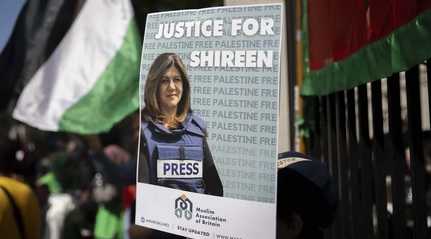
by Yousef Jamal AlRantisi
In relation to the death of Palestinian journalist Shireen Abu Aqleh, the following evidence was examined and analysed:
- available images of the crime scene,
- the Autopsy Report of the victim that was issued by Palestinian Forensic Medicine,
- witness reports, including from attending medical personnel,
- location of the resistance fighters at the time of the killing, and
- all the possibilities and angles of the shooting of journalist Shireen Abu Aqleh.
Autopsy report
The results of the initial forensic medicine report indicate that the direct cause of death was brain damage caused by a high-velocity bullet. The bullet penetrated the skull cavity causing an entry wound and then exited from the cavity causing another wound. Following that, the bullet hit the internal side of the protective helmet, ricocheted and lodged in the damaged tissues inside the skull.
The bullet was extracted and referred to the forensic laboratory for detailed analysis and a technical report.
Crime scene
By analysing the available photographs of the crime scene, it was found that the trajectory of the bullet that killed the journalist Shireen Abu Aqleh could only have originated from where the Israeli forces raiding Jenin were positioned.
Claims the bullet may have been fired by resistance fighters
After analysing the location of where the resistance fighters were located and where the crime took place, it was found:
- that it is impossible for the resistance fighters' bullets to reach the location where Shireen was,
- the trajectory and angle of the bullet shows it cannot have originated from where the resistance fighters were located,
- The presence of fixed and high barriers prevents a clear and direct line of sight from where the resistance fighters were located,
- Concrete buildings between the Palestinian resistance and the place where Shireen Abu Aqleh was killed make it impossible for a bullet to penetrate these, then continue on to hit and kill the victim,
- There were no other persons in the area, which was effectively under Israeli military control, that could have fired the fatal shot.
The effective lethal range of weapons that use 5.56 mm caliber ammunition is approximately 400 metres. From the analysis of the nature and severity of the victim's injury, it is clear that the bullet was fired directly from medium range, and this is consistent with the distance between the victim and the Israeli force storming the Jenin camp, which is 150 metres.
Criminal intent
From the analysis of the scene of the crime and the nature and site of the fatal shot, it is concluded that the crime was committed intentionally:
- The site of injury in the victim's body is between the protective jacket and the helmet, just below the ear, a sensitive position vulnerable only to an experienced sniper,
- Israeli forces continued to shoot at anyone who tried to rescue her,
- Ambulance personnel reported the presence of signs of shooting on the tree next to where the victim was killed, at chest/head height.
Analysis of the images received from the crime scene, the respective locations of the victim, the Israeli forces and the Palestinian resistance fighters, the trajectory of the bullet as revealed by the Autopsy Report and the crime scene, and the Autopsy Report itself, reveals that:
- Journalist Shireen Abu Aqleh was exposed to a single bullet that penetrated the head and the bullet returned to the head after exiting because it hit the inner layer of the helmet.
- The shooting was not random, but rather focused and precise, and this is confirmed by the convergence of holes in the tree trunk that was next to the body of the victim, Shireen Abu Aqleh.
- The perpetrator of the killing of journalist Shireen Abu Aqleh is without doubt the Israeli army, given the trajectory of the bullet, the respective locations of the victim, the Israeli soldiers, and the Palestinian resistance, as well as the impossibility of the victim being hit by any other party in a space controlled by the Israeli occupation.
The report recommends the following:
- The bullet extracted from the victim's body must be examined and compared with the weapons involved in this crime,
- The identity of the shooter must be established,
- This procedure requires an international commission of inquiry with the power to force the Israeli occupation to hand over the weapons carried by its soldiers on the day of the crime in Jenin.
This content was published in Middle East Monitor on May 19, 2022. To restrict the overall size; some images may have been excluded.
Opinions expressed in this article are the author's own and do not necessarily reflect the views of UMMnews.




